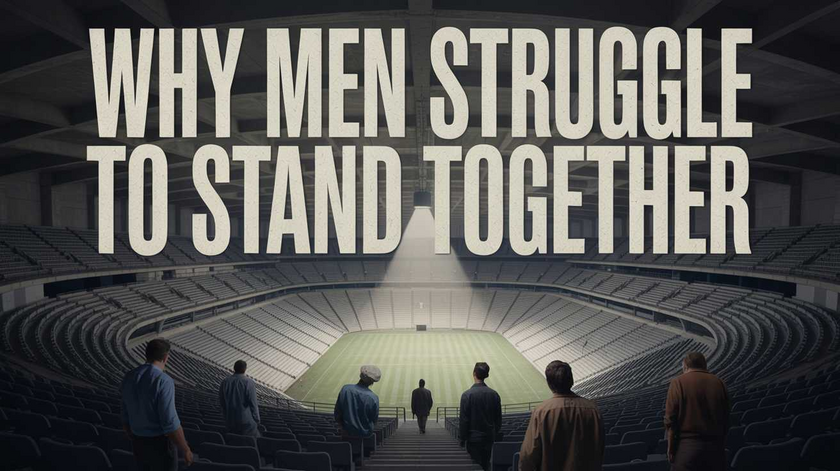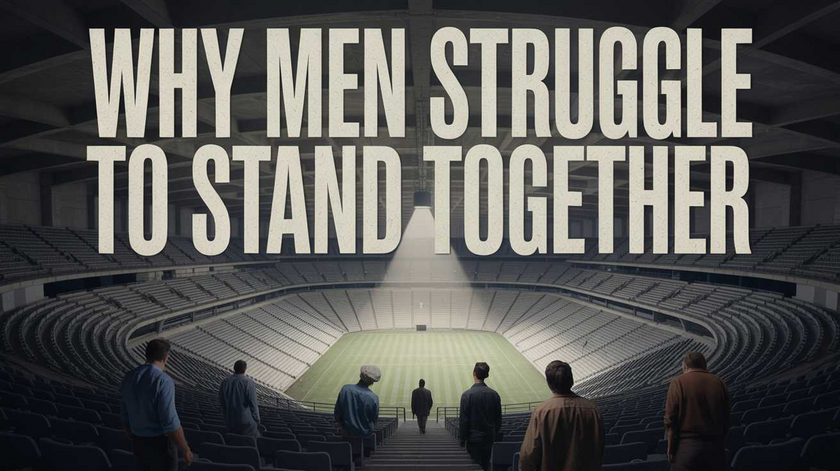
It’s no secret that men and women are different—but one of the lesser-known differences, and one of the most socially consequential, is found in how each sex relates to their own group.
Women consistently show strong in-group bias. They support each other socially, emotionally, and politically. They instinctively identify with the struggles of other women. This solidarity forms the backbone of movements, activism, academic departments, and public policy. When a woman sees another woman being mistreated, her response is often immediate: “That could’ve been me.”
Men, by contrast, tend to show weaker and more conditional in-group bias. Their loyalty to other men is context-dependent, usually tied to shared purpose or external threat. A man will stand with another man on the battlefield, on the job site, or on the basketball court—but outside of those types of goal-oriented bonds, that sense of male unity often fades.
Why is that?
Part of it is biological and evolutionary. For men, life has always been a mix of coalition and competition. Throughout history, men had to work together in tribes or hunting parties—but within those groups, they also competed for rank, dominance, and access to mates. That means male bonding has always existed alongside male rivalry. The result? Male loyalty is real, but fragile.
Even today, many men see other men as rivals first, allies second. If another man struggles—loses his job, breaks down emotionally, or gets mistreated in a custody battle—he may not get support. He may get silence. Or worse, blame. Because in the male psyche, weakness often reads as threat. It disrupts the unspoken expectation that men must be strong, self-reliant, and in control. In male hierarchies, weakness can be seen as a liability—something that drags down the group or exposes it to risk. And for many men, seeing another man suffer can stir up buried shame or fear about their own vulnerabilities, leading them to distance themselves rather than lean in. It’s not cruelty—it’s biology and conditioning.
This fragile in-group bias creates a massive hurdle for any effort to advocate for men. Men’s rights movements, fatherhood initiatives, male mental health campaigns—they all struggle not just because society ignores them, but because men themselves often fail to show up for one another. And this problem isn’t just internal. It’s magnified by something even larger: gynocentrism.
Gynocentrism: The Cultural Blind Spot
Gynocentrism is the cultural tendency to prioritize women’s needs, feelings, and safety—often at the expense of men. It’s not just a personal bias; it’s institutional, ideological, and deeply embedded in our narratives about right and wrong. From early childhood, boys are taught to protect girls, to defer to their emotions, and to take responsibility for female wellbeing. “Never hit a girl.” “Be a gentleman.” “Sacrifice for your wife.” These messages, no matter how well-meaning, train boys to associate virtue with serving women. They are rarely taught to protect or serve each other. This conditioning only deepens with age. In politics, education, and media, men gain status by defending women—not by defending men. A man who speaks up for women is seen as noble and progressive. A man who speaks up for men is seen as angry, bitter, or fragile—even by other men.
In a gynocentric culture—where women’s needs are prioritized and viewed through a moral lens—advocating for women is seen as virtuous, while advocating for men is viewed with suspicion or hostility.

“Women’s advocacy is empathy”
When women advocate for women (or when men advocate for women), the culture responds with compassion, validation, and support. It’s framed as morally good, emotionally sincere, and socially necessary. Example: “We need to hear women’s voices.” “Support women’s mental health.” “Believe women.”
“Men’s advocacy is grievance”
When men advocate for men, it’s often framed as whining, resentment, or a push to reclaim lost power. Instead of evoking empathy, it triggers defensiveness, mockery, or accusations of misogyny. Example: “Why are you complaining?” “This sounds like toxic masculinity in disguise.” “You just want to take us back to the 1950s.”
Say the phrases out loud “We need to hear men’s voices“ or maybe “Believe men.“ Can you feel the difference?

So the double bind is:
Women can talk about their pain and gain moral authority.
Men talk about their pain and risk losing moral credibility.
In other words:
If you advocate for women, you’re seen as compassionate.
If you advocate for men, you’re seen as angry.
That’s the trap—the double bind—created by gynocentrism. So male in-group bias—already fragile—is further fractured by gynocentric incentives.
The Costs of Division
This has enormous consequences.
When a man is falsely accused, other men don’t rally to his defense—they distance themselves.
When a father loses access to his children, he’s often blamed rather than supported.
When men talk about depression or suicide, they’re often met with discomfort, not compassion.
Meanwhile, female solidarity flourishes. Women have entire university departments, legal protections, and billion-dollar initiatives devoted to their advancement. And they have what men lack: a deep, culturally accepted instinct to care for each other.
The result is a lopsided world: female pain is collectivized and acted upon; male pain is individualized and ignored. It should now be obvious that working as a men’s advocate, a fatherhood proponent, or in any male-focused cause is an uphill battle—while those promoting women’s causes are coasting downhill with cultural tailwinds, institutional funding, and moral permission at their backs.

Rebuilding Male Solidarity
If men are to thrive—not just as individuals, but as a group—they must begin to reclaim something long buried: a sense of mutual loyalty. A belief that other men are not your enemy. That another man’s pain is not a sign of his failure, but of a culture that has failed us all.
This doesn’t mean abandoning competition or suppressing masculine traits. It means building solidarity around them. Men’s greatest strength has always been in what they can do together—on the battlefield, in a brotherhood, on a team. The challenge now is to transfer that loyalty into emotional and cultural arenas, where men are bleeding quietly in the shadows.
Men don’t need to become women to support each other. They just need to recognize that being on the same team means protecting the players who are getting crushed—by courts, by culture, by silence.
Male pain is real. Male sacrifice is real. Male disposability is real.
But male brotherhood can be real too—if we decide to make it so.
Men Are Good



















